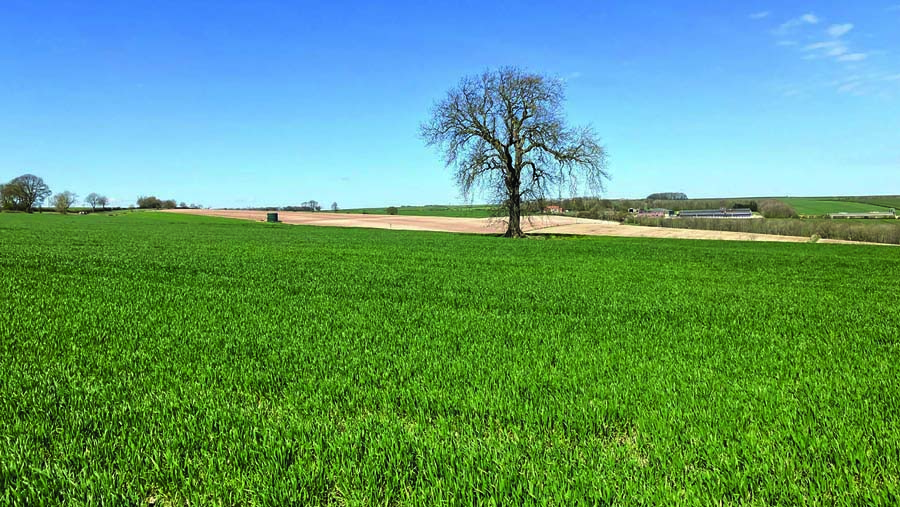Tenanted land offerings plateau but meet good demand
 © Alnwick Farming and Property Consultants
© Alnwick Farming and Property Consultants There’s plenty of interest in the relatively low acreage of tenanted land coming onto the market.
Investors and farmers represent the main buying interests, environmental charities are also in the mix, while institutions are both buyers and sellers.
Much of the activity so far this year seems to have been concentrated in the North of England.
However, nationally the number of let farms marketed appears to have plateaued generally, says Will Douglas of Savills’ York office.
Activity from institutional buyers tends to be limited to where there is longer term strategic potential, he says.
See also: What renter reform means for rural residential landlords
“We are seeing good demand first for quality arable holdings with limited liabilities and minimal landlord’s obligations – in other words on a full, repairing and insuring lease.
“Second, for land with strategic development potential. This often pulls in more interest from investors who like the potential of being able to extract additional value over and above the agricultural land value.”
Reasons for sale
Sales tend to be as a result of a generational change in ownership and a requirement to release equity, while those looking for pure income returns choose to take equity out of the sector and invest in a higher yielding asset, he says.
“Institutional sales tend to be as a result of a review of a portfolio and changes to investment strategies.
“Buyers are motivated by the tax efficient investment environment and/or the potential longer term vacant possession value.
That reversionary value is averaging around 35% at the moment, for Agricultural Holdings Act (AHA) tenancies or farm business tenancies (FBTs) of longer than 10 years,
“I sense more stock has come onto the open market and it is selling.
“Historically, there has been more private activity to tenants, but with rising interest rates, volatile commodity markets and the falling Basic Payment Scheme affecting cashflow, some sitting tenants are finding it harder to raise the capital.”
Financial yield on let land
Sales of let land are typically at yields of 1-1.5%, although for certain sales yields are below this, speculating on mid-to-longer term values or an angle for alternative use potential, says Oliver Stones of Alnwick Farming and Property Consultants.
“There is an appetite for good AHA let land,” he says. The firm has 117 acres of wold land on the market at Huggate, East Yorkshire, with a guide price of £7,965/acre or £930,000 as a whole.
Potential buyers are also interested in a small field in the same ownership on the edge of the village, which may be available too, along with some buildings.
The land is in the first generation of an AHA 1986 tenancy, with no known successor at present.
It as attracted a good deal of interest from both investors and local commercial farming buyers with property portfolios, says Oliver.
Also in the North East, 26 acres of arable land at Danby Wiske just north of Northallerton was sold this summer through agent Robin Jessop.
This was let on an FBT until August 2025 at £100/acre.
“It was guided at offers in excess of £10,000/acre and there was serious competition from local farmers. However, a sale was agreed to an investor well above the guide price,” says Robin Jessop.
Sam Holt, a director in Strutt & Parker’s estate and farm agency department, says there has been more let land on the market this year.
This includes the sale of the 2,526 acre Finedon and Irthlingborough Estate in Northamptonshire and the 1,068 acre Thistleton Estate in Rutland.
Both of these were launched on behalf of the same owner by Strutt & Parker earlier this summer and are now under offer.
“There is no significant number of large landowners disposing of farmland assets The supply of single let farms to the market has also been limited,” says Sam.
“Investors are looking for estates with diverse revenue streams to generate a return on their investment.
“The level of interest will depend on the terms of any tenancies and specific elements of the farm.
“Diverse estates that tick a number of boxes are generating interest and selling well, but those that don’t, or are overpriced, can struggle.
Planning to sell let land?
For landowners thinking of selling, prior preparation is essential, says Will Douglas.
“Resolve any outstanding tenant matters, and it is crucial to involve your tenant at all stages of the process. Communication is key to provide clarity on the process and what obligations fall where.”
